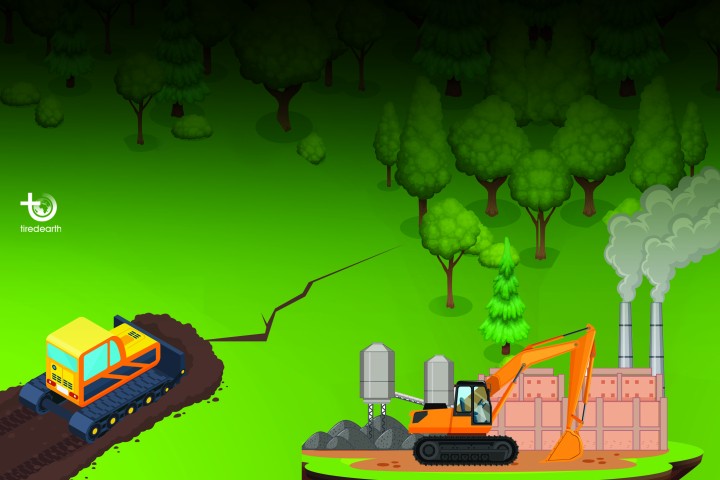Nature’s Blueprint

Let me begin by quoting from Peter Wohlleben’s superb, The Hidden Life of Trees: “… out there under the trees, the law of the jungle rules. Every species wants to survive, and each takes from the others what it needs. All are basically ruthless, and the only reason everything doesn’t collapse is because there are safeguards against those who demand more than their due. And one final limitation is an organism’s own genetics: an organism that is too greedy and takes too much without giving anything in return destroys what it needs for life and dies out.” (p.113).
Now imagine that an economy is an ecosystem, with we humans as its species. Wohlleben’s words suddenly take on a wider meaning: they infer that because our economies take from the world ecosystem and put very little back, the human race is on a fast path to self-destruction. Many people claim this anyway, but it’s mostly opinion, not based on any science. In Junglenomics, I look at our environmental predicament through the lens of science in order to understand what has gone wrong at the deepest level, and from that to find solutions that will allow us to live benignly alongside Nature for the foreseeable future.
It is well understood that in Nature two fundamental drives rule above all else: that to survive, and that to reproduce. All species development and behaviour must be geared towards these two essential functions or they would die out. However, there is a third, less well recognised drive: that to colonise new resources. I call it the “third imperative” and it’s very important, not just in its major role in evolution, but in the context of our behaviour on this planet. This is because the genes that inevitably underlie all resource-colonising behaviours in the wild are alive and well in us too. We are prone to admiring ourselves for our unique intelligence and achievements, and most believe we have risen to a plain far above other species - that the economic world we have created around us is an entirely unprecedented ‘otherworld’. But that view doesn’t stand up to examination. Why? For a start because the greatest power in all living creatures is genes, and we share up to 99% of them with wild animals. This means we’re not nearly as in control of our actions as we’d like to think; which in turn means we’re not anything like as smart and independent as we claim to be. Nowhere is that more evident than the in the world of business and markets – the “economic jungle”. Here, the instincts that made us who we are (an intelligent ape) do what they have always done best - drive us to colonise ever more resources. Only now, technology has given us unprecedented power to excel at it. Some people call this greed. But a more scientific description is “resource hunger” – a natural phenomenon. However, the invention of money has had a magnifying effect on resource hunger. Because money is exchangeable for anything it has become a universal resource. Fired by the hoarding instincts brought about by our dependence on agriculture, money has vastly increased resource hunger and hence accelerated resource colonisation to meet the demand.
Thus it is that the combination of markets, money and technology has become a three-headed monster - a Chimera that has produced a vast array of objects and foodstuffs that are not accountable for the environmental fallout they cause, and this is steadily destroying the natural balance of our planet. Is it evil? No. It merely reflects the reality that nature and natural impulses far stronger and more ancient than we realise are flowing through our bodies. It is nothing to be ashamed of. It comes to us through our genes – the very same genes that drove our ancestors and their wild relatives to the pursuit of resources and the establishment of ecosystems. So, what to do about it?
There are those who believe that all this can be solved through ideology; that somehow the entire world can be persuaded to rise above these 3 billion-year-old genetic impulses; that through anti-growth “eco-socialism” the human world can somehow be shoe-horned into a new era of environmentally conscientious behaviour; that if proselytised enough, greenness will be adopted as a universal new age creed at the expense of capitalism, as if the two were incompatible. But while the politics is easy to spot, where’s the science? It’s like an aircraft with a blind pilot - I’m not flying in that one either. At this critical juncture, ideologs should not divert us from doing the real business – adopting pragmatic economics-based solutions founded in evolution, anthropology and ecology. That means, not vainly struggling against the unsurmountable realities of genes and Nature, but instead turning them to the world’s advantage by imitating Nature’s sublimely successful three-billion-year-old blueprint centred on symbiosis, resource recycling and behavioural accountability.
The bottom line is that changing the current destructive trajectory is all about economics. Economics in the form of markets created the problem, and only by manipulating those markets can we change the game to make environments and the species they contain more valuable alive and healthy than dead and degraded - make rainforests financially more valuable intact than as lumber, for example. We still have time to turn around the economic juggernaut that is careering towards major planetary disruption and extinctions, but only if we listen to the science. Einstein said, “Look deep into Nature, and then you will understand everything better” - was the greatest brain of the 20th century wrong?
In the final part I’ll take a look at some of the practical ways we can turn this understanding about Nature, economics and markets into real-time action.

